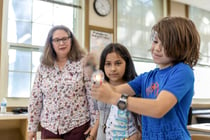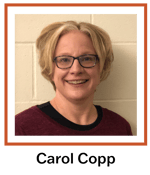Posted in: Aha! Blog > Wit & Wisdom Blog > Teacher Engagement Implementation Support > Navigating Year One of Wit & Wisdom® Implementation
Be patient and trust the process. Give yourself and your students some grace, especially during the pandemic. And know that your students will ultimately rise to Wit & Wisdom’s high expectations.
Those are among the key takeaways from recent conversations with four Wit & Wisdom® Fellows about how to navigate the first year of implementing our rigorous English language arts curriculum. Edited excerpts from the conversations follow.
Our Wit & Wisdom Fellows
Grade 2 Teacher
Gwynns Falls Elementary School
Baltimore, Maryland
Teaching for 15 years
Using Wit & Wisdom since 2017–2018 school year
Grade 7 Teacher
Robert J. Elkington Middle School
Grand Rapids, Minnesota
Teaching for 26 years
Using Wit & Wisdom since 2019
Grade 1 and Grade 3 Teacher
Dorothy I. Height Elementary School
Baltimore, Maryland
Teaching for six years
Using Wit & Wisdom since 2017–2018 school year
Grade 8 Teacher
Vine Middle School
Knoxville, Tennessee
Teaching for 19 years
Using Wit & Wisdom since 2018
The curriculum will make your teaching easier, but you need to plan.
The fellows appreciate how rigorous, comprehensive, and thoughtfully designed the curriculum is. With Wit & Wisdom, teachers don’t have to cobble together standards-based lessons on their own, so they have more time to spend strengthening their instructional craft.
Copp: Teachers are freed up to be teachers. You don’t have to spend your evenings on teacherspayteachers or writing a test when it’s been done for you. And Wit & Wisdom is research based, it’s tied to the standards, and everything is centered on a text.
She also appreciates how the curriculum opens doors for her students, most of whom are from rural areas.
Copp: When we get to do some analysis of art in class, it’s a door opening for my students. They can see something that they wouldn’t have seen before. They read books in the volume of reading list that they never would have picked up off the shelf.
Johnson appreciates how his students see themselves in the lessons. Chinn appreciates how all the instruction centers on the study of core texts, not disparate materials.
Johnson: They were very interested in Ellis Island, in knowing how people navigated their way. But they were also interested in the California Gold Rush that was featured in one of the texts.
Chinn: Everything is based on the text. I don’t have to go plan a writing lesson to teach nouns. I don’t have to plan a speaking and listening lesson. Everything is a perfect marriage of all of that in one place, and we can do it by looking at one book. It’s not disconnected.
Yes, the pacing is challenging, but give yourself grace.
Even successful teachers find covering all the content in Wit & Wisdom a challenge, especially in year one. Be patient with yourself, and focus on quality over quantity.
Copp: It would take me two to two and a half class periods to get through a lesson, and that’s okay because my philosophy is that some Wit & Wisdom is better than no Wit & Wisdom.
Lyle: What I know now that I wish I knew in year one is that nothing is in the curriculum by accident. Nothing is in there that hasn’t been very carefully and thoughtfully placed there. So if you get to something and you feel like it’s disposable, it really isn’t.
I would much rather teach the lessons really well and only get through two or three modules than rush through, cut things out, chop it all up, and get through four modules but not have taught them well. So just be at peace with the pacing. You still will [address all the standards]. You won’t get to all the core texts, but you’ll get through the standards. Be at peace with teaching two modules in year one, and then maybe you’ll get through three of them in year two.
When you’re implementing Wit & Wisdom, you have to be really patient with yourself. I was a veteran teacher with 15 or 16 years of teaching under my belt. In a lot of ways, I felt like a new teacher again. Because I was.
Johnson: If I had to give any advice to teachers, I would say to exercise grace both with their students and with themselves. Study the curriculum as a whole. Use the Implementation Guide. Experiment and ask for help.
Become a learner yourself.
To get the most out of the curriculum, teachers need to be willing to be learners themselves. Careful planning is essential. Chinn says teachers need to “take the seat of the learner.”
Chinn: Breathe and take it all in and study it and learn it. That’s the biggest piece. Being comfortable with it. So, you’re going to have to go through the Implementation Guide. You’re going to have to go through the Moving Forward with Wit & Wisdom User Guide. You’re going to have to go through and read the lessons and become familiar with the Teacher Edition. Read through your assessments. Read through the module tasks. Read through the Focusing Question Task.
Copp: My advice to new teachers using Wit & Wisdom is do the Preparation Protocols, whether that’s through professional development, training through Great Minds®, or in your professional learning communities, but definitely use those because you’re able to dig into the meat of the work.
Use the Implementation Guide.
Copp: Every teacher should have a copy of the Implementation Guide handy.
Lyle: Your Teacher Edition has your lessons in it, but the Implementation Guide has everything you need to know about all of the different instructional resources, the rubrics, how to set up your classroom. I can’t stress enough how much useful information is in the Implementation Guide.
Take advantage of support.
Teachers don’t have to do the work by themselves. The fellows advise getting as much support as possible—from administrators, from Great Minds, and from colleagues inside their buildings and around the country.
Copp: Rely on your team and the resources that you have and reach out on social media platforms or to other Wit & Wisdom teachers or the fellows or implementation specialists.
Lyle: One of the best things that I did was to start following Wit & Wisdom on social media: Facebook, Twitter, and Pinterest. I really got involved in the Facebook group, and through that I was able to connect with teachers from all over the country. One of them is now a real mentor to me.
Empower students—they’ll rise to the high expectations. Embrace the productive struggle.
The fellows advise letting go. Give students more responsibility for their own learning.
Johnson: Let the students drive. If they’re about to get into an accident, you know you’re like that driving instructor. Push that brake and you’ll be fine. A lot of teachers are scared to let go. Remember that as the teacher you are the MapQuest, and the students are the drivers of their learning. That’s the real major shift!
The fellows pointed out the benefits of productive struggle for students.
Copp: They’re seeing how they can rise to the occasion and that they can do difficult work. That makes me proud. Now, it has not been easy. It has not been without its challenges or without parents who are upset that it’s too difficult and their children are stressed out at home. I get that. I’m a parent, but we have to just recognize that all of that stuff is good stuff, and that’s okay. It’s okay to struggle.
They also spoke eloquently about their students rising to the challenge of a content-rich curriculum such as Wit & Wisdom. Copp taught Wit & Wisdom for the first time during the pandemic-shortened 2019–2020 school year.
Copp: You know when you have high expectations for students and the curriculum has high expectations for them, what they can actually achieve. Even in that short amount of time and not a complete school year, what they were able to achieve was amazing.
Lyle recalled an insight from her students after they read three very different books during Grade 8: The Crossover by Kwame Alexander, the World War 1 novel All Quiet on the Western Front, and Shakespeare’s A Midsummer Night’s Dream.
Lyle: They said, “I bet if someone from Shakespearean days were to show up in our classroom and we gave them The Crossover, they wouldn’t be able to read it. They wouldn’t understand that language because it’s just from a different time, and it’s different from the way they used to speak. This is just another type of language that we just need to get used to. It’s not harder, it’s just different.” That was such a great connection.
Students will be much more engaged and excited to write.
Copp: I do have disengaged students, but most students are excited about writing. I have students who are able to sit down and take everything that they’ve learned from this semester and put it into a piece of writing. When a seventh grader is excited about learning at all, I think that’s a win.
Lyle: I definitely see more of a willingness to engage in academic discussions and in writing tasks. I have fewer students asking me things like “How many sentences does this have to be?” That’s an English teacher’s least favorite question. The reason is because students have the knowledge they need to respond to the prompt. And they have the confidence that they need to answer the question. Their writing may not be technically perfect or even proficient. But if I can get them to put the words on the paper because they have the knowledge, then I can give them the feedback that I need to improve their technique.
Bottom line: Trust the process, be patient, and persevere.
Chinn: It is definitely not going to look like the classroom of old, but just be able to settle yourself enough to allow the students to go through the process. And know that on the back end, you are really going to have some aha moments. There will still be days when you’re just like “That was an epic fail.” But know that those days are going to be far fewer if you just trust the process.
Copp: You’re going to have days where you feel like you’ve made no headway and everything that you’ve done isn’t working. But you need to continue and persevere because your students will be writing amazing things. Your students will be conducting a Socratic Seminar by themselves and will be analyzing text. What they can do in seventh grade is amazing. I have a 17-year-old, and she says my seventh graders are doing what she’s doing in 11th grade.
- Understanding Wit & Wisdom
- The following resources are available in the Wit & Wisdom Teacher Resource Pack.
- Implementation Guide
- Moving Forward with Wit & Wisdom
- Module Zero for all grade bands (K–2, 3–5, and 6–8)
- Preparation Protocols
Submit the Form to Print

Jenny Taylor
Jenny has over a decade of experience in education policy and research. She has worked with states and districts on the development and implementation of college and career readiness policies, especially around the implementation of rigorous standards and high-quality instructional materials. She has extensive knowledge about K–12 standards, graduation requirements, assessments, and accountability systems nationwide. Additionally, she has conducted research for school districts to address pressing needs in those districts. Jenny received her B.A. in English and education from Bucknell University and her M.Ed. in education policy from the University of Pennsylvania Graduate School of Education.











